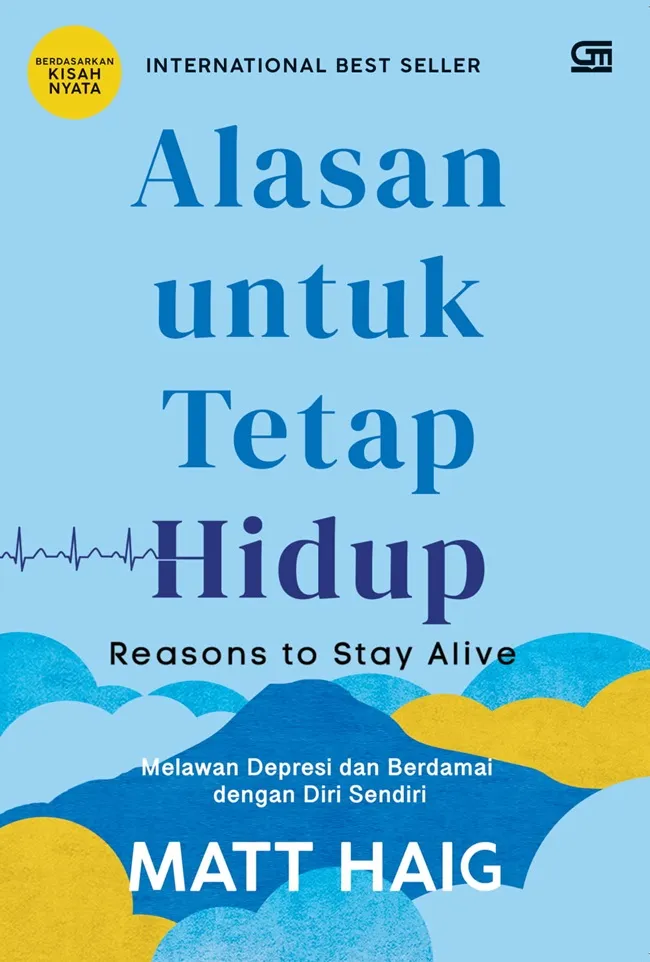Alasan untuk Tetap Hidup (Reasons to Stay Alive)

Author: Matt Haig
Category: Memoir
Language: Indonesian
Publication Year: 2020
Pages: 275
Description:
"Alasan untuk Tetap Hidup (Reasons to Stay Alive)" by Matt Haig is a deeply personal and honest exploration of mental health, specifically his journey through depression and anxiety. What makes this book resonate with so many readers is how relatable and raw it feels. Rather than presenting a dry, clinical analysis of mental illness, Haig opens up about his own experiences, making it accessible to anyone who has struggled with their mental health or knows someone who has.
The book isn't laid out like a traditional memoir or self-help guide. Haig jumps between different styles—short essays, reflections, lists, and anecdotes—making it feel more like an open conversation. This varied format works well for a topic as complex and heavy as depression, and the breaks between the more intense sections give readers time to digest what they've read. One moment, you’ll be reading a painful memory from Haig’s darkest days, and the next, you'll find a list of things worth staying alive for, like "the smell of rain on a hot pavement" or "the first sip of coffee."
One of the most striking things about Haig’s writing is his ability to articulate the often indescribable feelings that come with mental illness. He talks about the fog of depression, the way time seems to warp, and the crushing feeling of being overwhelmed by something you can’t quite understand. Haig describes depression as a thief that steals away joy, energy, and sometimes the will to continue, but he also emphasizes that recovery is possible, even when it seems distant.
Haig's humor plays an important role in the book, adding levity to a very serious subject. His sense of humor isn't overpowering, but it pops up in moments where you least expect it, softening the blows from the heavier themes. It’s like hearing a joke in the middle of a long, hard conversation—brief but welcome. He manages to convey how absurd life can feel when you’re battling mental illness, which helps break the tension and offers some moments of relief.
The book doesn’t pretend to have all the answers, and Haig is upfront about the fact that his way out of depression might not be the same for everyone. He talks about how difficult it can be to take advice like “just think positively” or “go outside more,” which often oversimplify a very complicated issue. Instead of preaching a one-size-fits-all solution, Haig shares what worked for him, like reading, writing, and spending time with his loved ones. He also touches on the importance of self-compassion, reminding readers that it’s okay to feel bad sometimes and that healing isn’t a straight line.
Another powerful element of the book is Haig’s focus on hope. The title itself, "Reasons to Stay Alive," reflects this. He acknowledges how, when you're in the depths of depression, hope can feel non-existent, but he encourages readers to hold on because things do get better. His message isn't overly sentimental or unrealistic—it’s grounded in his own experience of coming back from the brink and finding joy in life again.
While the book is centered on Haig’s personal battle with depression, it also broadens out to touch on how society treats mental illness. He criticizes the stigma that still surrounds mental health issues, particularly for men, and how this can make it harder for people to seek help. Haig’s vulnerability in sharing his story is a reminder that mental illness doesn’t discriminate, and that talking openly about it is one of the most important steps toward healing.
"Reasons to Stay Alive" is a moving, insightful, and at times funny read. It offers a look into the mind of someone struggling with depression, while also offering a glimmer of hope for anyone who feels like they might never get better. Haig's honest, unpretentious style makes it easy to connect with him, and his message is simple: life is worth living, even when it doesn’t feel that way. Whether you’re someone dealing with mental illness or simply trying to understand it, this book is a gentle, reassuring companion.
Personal Notes:
Not Matt Haig's best book, and it contains lots of cliches. Lots of people love it, though, so I thought the book must have something in helping people.
Back to Home